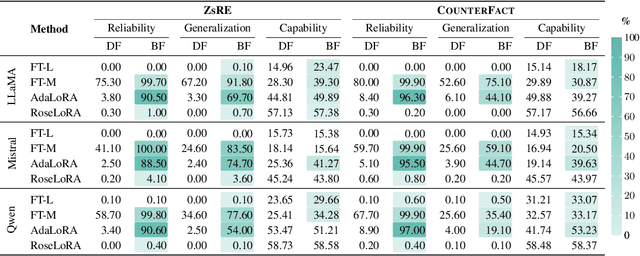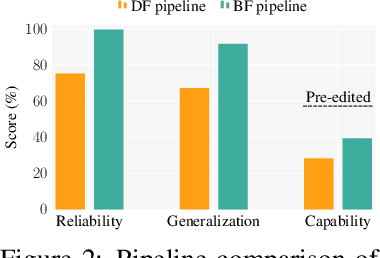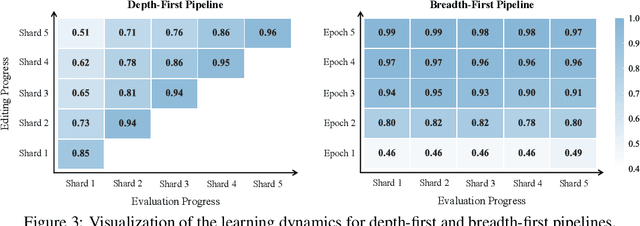Qi Cao
DAJ: Data-Reweighted LLM Judge for Test-Time Scaling in Code Generation
Jan 29, 2026Abstract:Test-time scaling for code generation commonly relies on Best-of-N selection, in which multiple candidate solutions are sampled from a base model, and the best one is selected by an LLM judge. However, training reliable LLM judges is challenging due to severe distribution shifts, including imbalances between easy and hard problems, mismatches between training tasks and evaluation benchmarks, and trajectory mismatch arising from training data generated by cheaper models whose behavior differs from that of inference-time models. We propose DAJ, a reasoning-based LLM judge trained with verifiable rewards under a bi-level data-reweighted learning framework. The proposed framework learns data-importance weights (either domain-level or instance-level) to optimize generalization performance on a held-out meta set aligned with target benchmarks. To the best of our knowledge, this is the first application of data reweighting to LLM-as-a-Judge training for test-time scaling. Our approach automatically emphasizes hard problems, in-distribution samples, and trajectory-aligned data, without relying on hand-crafted heuristics. Empirically, DAJ achieves state-of-the-art performance on LiveCodeBench and BigCodeBench, outperforming strong test-time scaling baselines as well as leading proprietary models.
Models Under SCOPE: Scalable and Controllable Routing via Pre-hoc Reasoning
Jan 29, 2026Abstract:Model routing chooses which language model to use for each query. By sending easy queries to cheaper models and hard queries to stronger ones, it can significantly reduce inference cost while maintaining high accuracy. However, most existing routers treat this as a fixed choice among a small set of models, which makes them hard to adapt to new models or changing budget constraints. In this paper, we propose SCOPE (Scalable and Controllable Outcome Performance Estimator), a routing framework that goes beyond model selection by predicting their cost and performance. Trained with reinforcement learning, SCOPE makes reasoning-based predictions by retrieving how models behave on similar problems, rather than relying on fixed model names, enabling it to work with new, unseen models. Moreover, by explicitly predicting how accurate and how expensive a model will be, it turns routing into a dynamic decision problem, allowing users to easily control the trade-off between accuracy and cost. Experiments show that SCOPE is more than just a cost-saving tool. It flexibly adapts to user needs: it can boost accuracy by up to 25.7% when performance is the priority, or cut costs by up to 95.1% when efficiency matters most.
FunPRM: Function-as-Step Process Reward Model with Meta Reward Correction for Code Generation
Jan 29, 2026Abstract:Code generation is a core application of large language models (LLMs), yet LLMs still frequently fail on complex programming tasks. Given its success in mathematical reasoning, test-time scaling approaches such as Process Reward Model (PRM)-based Best-of-N selection offer a promising way to improve performance. However, existing PRMs remain ineffective for code generation due to the lack of meaningful step decomposition in code and the noise of Monte Carlo-estimated partial-solution correctness scores (rewards). To address these challenges, we propose FunPRM. FunPRM prompts LLMs to encourage modular code generation organized into functions, with functions treated as PRM reasoning steps. Furthermore, FunPRM introduces a novel meta-learning-based reward correction mechanism that leverages clean final-solution rewards obtained via a unit-test-based evaluation system to purify noisy partial-solution rewards. Experiments on LiveCodeBench and BigCodeBench demonstrate that FunPRM consistently outperforms existing test-time scaling methods across five base LLMs, notably achieving state-of-the-art performance on LiveCodeBench when combined with O4-mini. Furthermore, FunPRM produces code that is more readable and reusable for developers.
DreamPRM-Code: Function-as-Step Process Reward Model with Label Correction for LLM Coding
Dec 17, 2025


Abstract:Process Reward Models (PRMs) have become essential for improving Large Language Models (LLMs) via test-time scaling, yet their effectiveness in coding remains limited due to the lack of meaningful step decompositions in code and the noise of Monte-Carlo-generated partial labels. We propose DreamPRM-Code, a coding-focused PRM that treats functions as reasoning steps using a Chain-of-Function prompting strategy to induce modular code generation, enabling PRM training and application analogous to mathematical reasoning tasks. To address label noise, DreamPRM-Code introduces a meta-learning-based correction mechanism that leverages clean final-solution unit-test labels and performs bi-level optimization to refine intermediate labels. Applying on test-time scaling, DreamPRM-Code achieved state-of-the-art performance on LiveCodeBench with 80.9 pass@1 rate, surpassing OpenAI o4-mini.
AsarRec: Adaptive Sequential Augmentation for Robust Self-supervised Sequential Recommendation
Dec 16, 2025



Abstract:Sequential recommender systems have demonstrated strong capabilities in modeling users' dynamic preferences and capturing item transition patterns. However, real-world user behaviors are often noisy due to factors such as human errors, uncertainty, and behavioral ambiguity, which can lead to degraded recommendation performance. To address this issue, recent approaches widely adopt self-supervised learning (SSL), particularly contrastive learning, by generating perturbed views of user interaction sequences and maximizing their mutual information to improve model robustness. However, these methods heavily rely on their pre-defined static augmentation strategies~(where the augmentation type remains fixed once chosen) to construct augmented views, leading to two critical challenges: (1) the optimal augmentation type can vary significantly across different scenarios; (2) inappropriate augmentations may even degrade recommendation performance, limiting the effectiveness of SSL. To overcome these limitations, we propose an adaptive augmentation framework. We first unify existing basic augmentation operations into a unified formulation via structured transformation matrices. Building on this, we introduce AsarRec (Adaptive Sequential Augmentation for Robust Sequential Recommendation), which learns to generate transformation matrices by encoding user sequences into probabilistic transition matrices and projecting them into hard semi-doubly stochastic matrices via a differentiable Semi-Sinkhorn algorithm. To ensure that the learned augmentations benefit downstream performance, we jointly optimize three objectives: diversity, semantic invariance, and informativeness. Extensive experiments on three benchmark datasets under varying noise levels validate the effectiveness of AsarRec, demonstrating its superior robustness and consistent improvements.
Fine-tuning Done Right in Model Editing
Sep 26, 2025



Abstract:Fine-tuning, a foundational method for adapting large language models, has long been considered ineffective for model editing. Here, we challenge this belief, arguing that the reported failure arises not from the inherent limitation of fine-tuning itself, but from adapting it to the sequential nature of the editing task, a single-pass depth-first pipeline that optimizes each sample to convergence before moving on. While intuitive, this depth-first pipeline coupled with sample-wise updating over-optimizes each edit and induces interference across edits. Our controlled experiments reveal that simply restoring fine-tuning to the standard breadth-first (i.e., epoch-based) pipeline with mini-batch optimization substantially improves its effectiveness for model editing. Moreover, fine-tuning in editing also suffers from suboptimal tuning parameter locations inherited from prior methods. Through systematic analysis of tuning locations, we derive LocFT-BF, a simple and effective localized editing method built on the restored fine-tuning framework. Extensive experiments across diverse LLMs and datasets demonstrate that LocFT-BF outperforms state-of-the-art methods by large margins. Notably, to our knowledge, it is the first to sustain 100K edits and 72B-parameter models,10 x beyond prior practice, without sacrificing general capabilities. By clarifying a long-standing misconception and introducing a principled localized tuning strategy, we advance fine-tuning from an underestimated baseline to a leading method for model editing, establishing a solid foundation for future research.
GoalRank: Group-Relative Optimization for a Large Ranking Model
Sep 26, 2025Abstract:Mainstream ranking approaches typically follow a Generator-Evaluator two-stage paradigm, where a generator produces candidate lists and an evaluator selects the best one. Recent work has attempted to enhance performance by expanding the number of candidate lists, for example, through multi-generator settings. However, ranking involves selecting a recommendation list from a combinatorially large space. Simply enlarging the candidate set remains ineffective, and performance gains quickly saturate. At the same time, recent advances in large recommendation models have shown that end-to-end one-stage models can achieve promising performance with the expectation of scaling laws. Motivated by this, we revisit ranking from a generator-only one-stage perspective. We theoretically prove that, for any (finite Multi-)Generator-Evaluator model, there always exists a generator-only model that achieves strictly smaller approximation error to the optimal ranking policy, while also enjoying scaling laws as its size increases. Building on this result, we derive an evidence upper bound of the one-stage optimization objective, from which we find that one can leverage a reward model trained on real user feedback to construct a reference policy in a group-relative manner. This reference policy serves as a practical surrogate of the optimal policy, enabling effective training of a large generator-only ranker. Based on these insights, we propose GoalRank, a generator-only ranking framework. Extensive offline experiments on public benchmarks and large-scale online A/B tests demonstrate that GoalRank consistently outperforms state-of-the-art methods.
DreamPRM: Domain-Reweighted Process Reward Model for Multimodal Reasoning
May 26, 2025Abstract:Reasoning has substantially improved the performance of large language models (LLMs) on complicated tasks. Central to the current reasoning studies, Process Reward Models (PRMs) offer a fine-grained evaluation of intermediate reasoning steps and guide the reasoning process. However, extending PRMs to multimodal large language models (MLLMs) introduces challenges. Since multimodal reasoning covers a wider range of tasks compared to text-only scenarios, the resulting distribution shift from the training to testing sets is more severe, leading to greater generalization difficulty. Training a reliable multimodal PRM, therefore, demands large and diverse datasets to ensure sufficient coverage. However, current multimodal reasoning datasets suffer from a marked quality imbalance, which degrades PRM performance and highlights the need for an effective data selection strategy. To address the issues, we introduce DreamPRM, a domain-reweighted training framework for multimodal PRMs which employs bi-level optimization. In the lower-level optimization, DreamPRM performs fine-tuning on multiple datasets with domain weights, allowing the PRM to prioritize high-quality reasoning signals and alleviating the impact of dataset quality imbalance. In the upper-level optimization, the PRM is evaluated on a separate meta-learning dataset; this feedback updates the domain weights through an aggregation loss function, thereby improving the generalization capability of trained PRM. Extensive experiments on multiple multimodal reasoning benchmarks covering both mathematical and general reasoning show that test-time scaling with DreamPRM consistently improves the performance of state-of-the-art MLLMs. Further comparisons reveal that DreamPRM's domain-reweighting strategy surpasses other data selection methods and yields higher accuracy gains than existing test-time scaling approaches.
Too Consistent to Detect: A Study of Self-Consistent Errors in LLMs
May 23, 2025Abstract:As large language models (LLMs) often generate plausible but incorrect content, error detection has become increasingly critical to ensure truthfulness. However, existing detection methods often overlook a critical problem we term as self-consistent error, where LLMs repeatly generate the same incorrect response across multiple stochastic samples. This work formally defines self-consistent errors and evaluates mainstream detection methods on them. Our investigation reveals two key findings: (1) Unlike inconsistent errors, whose frequency diminishes significantly as LLM scale increases, the frequency of self-consistent errors remains stable or even increases. (2) All four types of detection methshods significantly struggle to detect self-consistent errors. These findings reveal critical limitations in current detection methods and underscore the need for improved methods. Motivated by the observation that self-consistent errors often differ across LLMs, we propose a simple but effective cross-model probe method that fuses hidden state evidence from an external verifier LLM. Our method significantly enhances performance on self-consistent errors across three LLM families.
The 1st Workshop on Human-Centered Recommender Systems
Nov 22, 2024
Abstract:Recommender systems are quintessential applications of human-computer interaction. Widely utilized in daily life, they offer significant convenience but also present numerous challenges, such as the information cocoon effect, privacy concerns, fairness issues, and more. Consequently, this workshop aims to provide a platform for researchers to explore the development of Human-Centered Recommender Systems~(HCRS). HCRS refers to the creation of recommender systems that prioritize human needs, values, and capabilities at the core of their design and operation. In this workshop, topics will include, but are not limited to, robustness, privacy, transparency, fairness, diversity, accountability, ethical considerations, and user-friendly design. We hope to engage in discussions on how to implement and enhance these properties in recommender systems. Additionally, participants will explore diverse evaluation methods, including innovative metrics that capture user satisfaction and trust. This workshop seeks to foster a collaborative environment for researchers to share insights and advance the field toward more ethical, user-centric, and socially responsible recommender systems.
 Add to Chrome
Add to Chrome Add to Firefox
Add to Firefox Add to Edge
Add to Edge